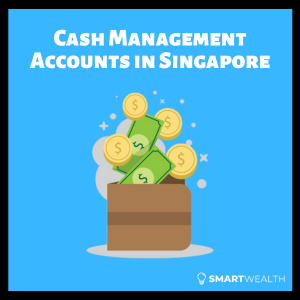Savings accounts have been the conventional route for many Singaporeans to store hard-earned money. You may also have tried to use a high-yield savings account to earn eligible bonus interest rates.
With rising inflation, you may realise that such accounts are unable to help you achieve your saving or investment goals.
This is when cash management accounts or cash management solutions come in handy.
Read on to find out more about them!
What Is a Cash Management Account?
Simply put, a cash management account in Singapore is usually provided by non-bank financial institutions, such as investment platforms and brokerages.
Such an account enables users to reap the benefits of higher interest rates by taking on investment risks that are a tad higher. Your funds are usually invested in money market funds and/or short-term bonds, which are deemed much safer than other volatile asset classes like equities.
Users also enjoy a decent level of liquidity as they can typically withdraw their funds without any lock-up.
Note that parking your funds in a cash management account is not the same as in an ordinary bank account. This is because you cannot use a debit card to capitalise on the wide networks of banks to withdraw money from ATMs. Also, you cannot leverage online payment services.
To boot, cash management accounts have only been unveiled in recent years, when robo-advisors tried to address the market gap to store idle cash. Hence, cash management accounts were introduced to provide investors with relatively decent liquidity and yields.
SIDE NOTE When was the last time you conducted thorough financial planning or reviewed your finances? In this day and age in Singapore, doing so will absolutely improve the quality of life for you and your loved ones. Here are 5 reasons why financial planning is so important.
Are Cash Management Accounts Safe?
If you are looking for zero-risk investments, then cash management accounts may not be the best option for you to grow your funds.
This is because, as mentioned earlier, investments using such accounts still carry a slight degree of risk. Also, as the saying goes, “no pain, no gain”, you must be willing and able to face a bit of investment risk if you wish to grow your funds in a shorter amount of time without fewer strings attached.
Moreover, the degree of risks you will be exposing your funds to is contingent on the type of funds that you invest in.
“Money market funds are traditionally regarded as a stable form of investment which offer investors a relatively low level of risk and high liquidity,” said Grace Yong, business development director of Tiger Brokers.
This type of fund is a mutual fund that could invest in debt securities with short maturities and low credit risk, as well as containing yields that usually track central banks’ interest rates.
Having said that, do remember that as your money is put into the underlying funds, the returns you get are eventually impacted by the market situation. For example, bond funds are affected by volatile interest rates, credit events, geopolitical risks as well as liquidity issues.
Factors to Consider When Choosing a Cash Management Account
1) Potential Returns
Notably, investments linked to cash management accounts are typically low risk, but that also implies that they have lower yields.
Parking money in this type of account means not making higher-yielding investments.
Although a cash management account typically generates more interest than a standard checking or savings account, several high-yield checking accounts or those provided by online banks could even reap higher interest.
2) Type of Funds Invested
You should not park cash meant for your daily needs in your cash management accounts as you cannot use banking services, such as ATMs, payment facilities on iBanking or debit cards. Withdrawals back to your savings can also take a few days to happen.
The wiser thing to do would be to invest only idle funds that you do not want to put into the volatile financial markets (e.g., stocks).
Such funds should also be needed in the shorter to mid-term.
Here are some examples of types of funds you could set aside in a cash management account:
- Money set aside for an impending big-ticket expense, such as a home renovation or vehicle purchase
- Emergency funds amounting to 6 to 12 months of your daily expenses
- Funds that you do not want to invest in the markets immediately, except when opportunity strikes or when the time is suitable
- Funds earmarked to buy a property, particularly after selling off investments or another property
3) Minimum Deposit
Depending on the provider offering the cash management account that you eventually open, you may or may not be required to have a minimum deposit. Even if they do, it is often fairly low (e.g., $1,000).
4) Fees
Also, whether you would be required to pay fees for the upkeep of your cash management account(s) would depend on the provider once again.
Some providers do not charge fees and some charge annual fees of around 0.05%. Note that these fees are platform fees and are usually on top of the underlying fund-level fees (after rebates). Platforms will inform you of such fees.
Pros and Cons of Cash Management Accounts
Here are some advantages and disadvantages of cash management accounts.
Pros
1) A safer form of investment
As compared to high-risk investments, cash management accounts offer a safer type of investment as the risks are relatively low.
DID YOU KNOW? According to a survey conducted by MoneySense, about 3 out of 10 Singapore residents aged 30 to 59 had not started planning for their future financial needs. This isn't surprising because personal finance can seem complicated and daunting. But really, there are only a few things that you should focus on. Learn how to significantly improve your personal finances with the 7-step "wedding cake" strategy today.
2) SRS fundable
Apart from cash, most cash management accounts also permit you to invest your Supplementary Retirement Scheme (SRS) account funds. Thus, you stand to benefit from tax reliefs while getting a decent interest return on your funds.
3) Liquidable at any time
You can easily withdraw your funds at any time, especially if you have earned decent returns and want to use your money to invest further or purchase a big-ticket item like a car. However, it takes a few steps for your funds to reach your bank account and the process could even take a week.
4) Fuss-free setups
Opening a cash management account is typically a no-brainer as this process can be done online, particularly if you already have an account with a chosen provider. Retail customers will stand to benefit from this seamless setup option.
Cons
1) Not capital-guaranteed
Bear in mind that your investments in cash management accounts are not covered under the Singapore Deposit Insurance Scheme (SDIC). Therefore, there is a possibility that you may lose part of your capital.
2) Lower returns
Compared to more volatile investments, investments in cash management accounts usually generate lower returns due to the lower risks involved. After all, you can only reap what you sow.
3) Fees
Some accounts have monthly fees or minimum balances that you must meet. You may incur fees for transferring money from your cash management account to another bank account or fees for closing your account.
3 Popular Cash Management Accounts in Singapore
Endowus Cash Smart Secure is one popular cash management account in Singapore. With this account, you can invest both your cash and SRS funds. Projected returns range from 3.5% to 3.8% p.a (after fees).
The second popular cash management account in Singapore is MoneyOwl Wise Saver, where you can invest both cash and SRS funds and look forward to projected returns of around 4.18% per annum (5-day moving average as of 31 Mar 2023).
Also, StashAway Simple enables you to invest cash and SRS funds with projected returns at 3.3% per annum (after fees).
At the end of the day, most of these cash management solutions’ underlying funds are the same or are very similar. The main factors to decide on one would be the objectives of the underlying funds, their weightage, fund-level fees, and platform fees (if any).
The Alternatives: High-Interest Savings Accounts, Fixed Deposits, and Singapore Savings Bonds (SSBs)
If you are more risk-averse and would like to park your cash in safer types of accounts, consider a fixed deposit account as one option. The latter refers to an account permitting you to safely invest while earning a fixed interest return. It usually guarantees returns with no risk of loss of the principal amount. Generally, fixed deposit accounts are regarded as the safest type of investment as they are not impacted by market fluctuations.
If you want to reap higher interest returns, consider a high-interest savings account that offers more interest returns than regular savings or fixed deposit accounts. All you need to do is to be eligible for this type of account and compile your savings, bill payments, financial products and credit card spending into one account.
Alternatively, although the Singapore Savings Bonds (SSBs) may not be the most popular investment option to grow your wealth, their popularity has risen since its inception in 2015. Many Singaporeans have included SSBs as a part of their investment portfolios. The SSBs are issued every month by the Singapore government via the Monetary Authority of Singapore (MAS). They have a maximum tenor of 10 years, paying incremental interest returns over the years to benefit investors who hold them for a longer period. Both Singaporeans and foreigners can invest in SSBs, up to a limit of $200,000. Also, early withdrawals do not result in principal loss.
What’s Next?
2023 may not bode too well for Singapore in terms of economic growth and rising inflation rates.
If you want to get the maximum out of your available funds but do not wish to take on too high investment risks, consider putting money set aside for emergency funds or big-ticket items into cash management funds and its alternatives to get potentially higher interest returns.


